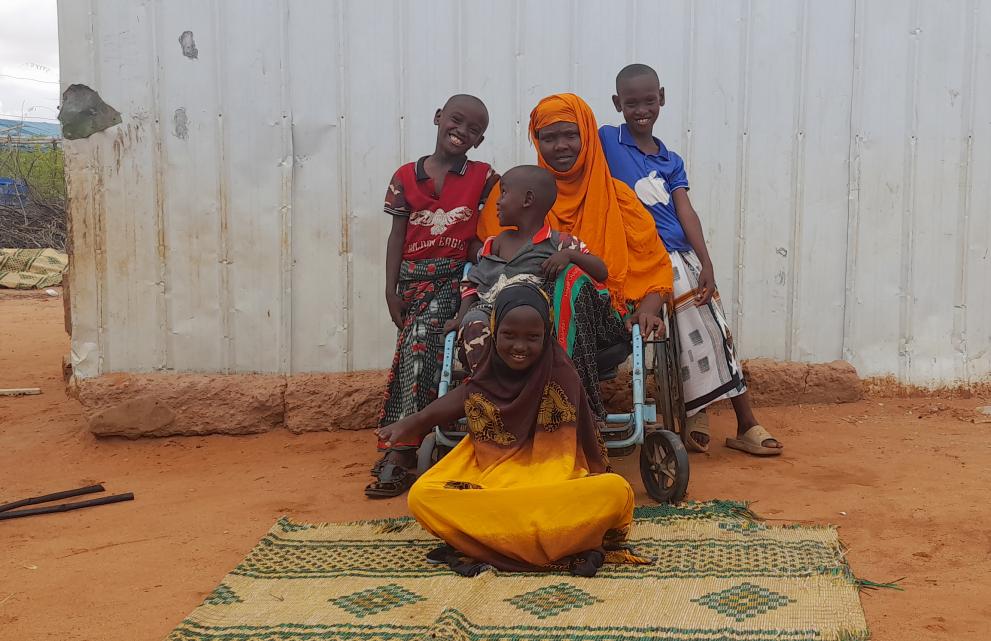
Resilience Amidst Adversity: Falhado's Tale in the Heart of Somalia
In the remote reaches of northeastern Somalia, within the Kabasa IDP settlement in the Dolow district of the Gedo region, lives Falhado Hure Ribah, a tenacious 35-year-old mother burdened with the challenges of physical disability and a family of seven. Her story is a testament to the transformative impact of social transfer cash assistance for People Living with Disabilities (PLWDs) in a region grappling with the harsh realities of climate change and conflicts.
Somalia stands at the crossroads of climate change and protracted conflict, bearing the weight of their massive impact. Increasingly severe climate-related shocks, coupled with a devastating drought in 2022, have pushed the nation to the brink of famine. Due to the poor rainy seasons, Gedo region of Somalia, like many other places in the country, has been affected by a severe drought. This was followed by the flooding in 2023 Gu’ rains (April to June), caused nearly 100,000 people have been affected by heavy showers and flash floods in several areas. Since mid-2021, at least 3.8 million livestock have died due to prolonged drought, devastating livelihoods in the country. The political tension in the Gedo region is also a cause for concern. Political instability and violence can disrupt essential services such as healthcare and education and can worsen the impact of natural disasters such as drought. It can also lead to displacement, as people flee their homes in search of safety.
Transforming Lives in the Juba - Corridor
To respond to these challenges, the EU has played a key role in supporting the development of a national social protection system in Somalia. The EU and the Ministry of Labour and Social Affairs of Somalia, have partnered with the Somali Cash Consortium to develop the Sagal Project, which covers four geographic corridors on Somalia. Specifically, in the Juba-corridor, which includes Dolow, Belet Hawo, and Kismayo districts, the project implemented by Norwegian Refugee Council, focuses on "People Living with Disabilities (PLWDs)," The objective is to provide vital, long-term support to address chronic poverty and vulnerability.
Falhado Hure Ribax residing in Kabasa IDP settlement, became a beneficiary of social safety net cash Transfer (Model 4). As a person with disability, she received a monthly cash transfer of 20 USD from November 2022. Falhado relocated from the village of Shatilow in the Luuq district 10 years ago, compelled by a combination of security concerns and the harsh impact of the drought. Now, at 35-years-old, Falhado is a mother with a physical disability affecting both legs, the result of a gunshot incident when she was just 7 days old. The gunshot inflicted damage to her nervous system, rendering disabled and severely limiting her mobility. Her family, consisting of 9 members, including 7 children (3 of the children are currently away with previous husband), find itself in a challenging financial situation, struggling to meet their basic needs.
Before her displacement, Falhado lived a different life. She was single and ran a small tea cafeteria in the rural village (Shatilow). However, her journey took a new direction as she moved to Dolow and eventually settled in the Kabasa IDP settlement, where she got married. Since then, her family’s livelihood, has depended on humanitarian aid and occasional casual work undertaken by her husband. At times, they are compelled to request or borrow food from their neighbors to make ends meet.
Reflecting on the impact of the cash assistance, Falhado emphasized its significance:
“After receiving the cash, I was also able to help my family, enabling to send my children to school. The monthly cash transfer gave me confidence to sustain the school fees of two children”.
She continued:
“Initially no one of my children was attending school. But the 20 USD helped me to regularly pay the fees for two of the children to attend qur’anic school and I pay 10 dollar per person/month”.
More about the project
The Social Transfers (ST) Model 4 component, part of the Sagal ILED project, was designed to address the enduring challenges of chronic poverty and vulnerability among People Living with Disabilities (PLWDs). The Norwegian Refugee Council (NRC), in collaboration with the Somali Cash Consortium led by Concern Worldwide (CWW) and the Somalia Ministry of Labour and Social Affairs (MoLSA), introduced the Sagal EU-ILED project in the Juba-corridor funded by the EU Emergency Trust Fund for Africa.
The project was implemented across key areas in the Juba-corridor, including Dolow, Belet Hawo, and Kismayo. A total of 2,755 households benefitted from this program.
The core objective of the ST Model 4 component was to bolster the resilience of these targeted households and to alleviate poverty within these communities. The implementation of monthly cash transfers played a pivotal role in achieving these goals, effectively enhancing the well-being and prospects of PLWDs and their families. This collaborative effort between NRC, CWW, MoLSA, and EU funding exemplifies a successful approach to addressing chronic poverty and vulnerability in these regions.
Details
- Publication date
- 20 November 2023
- Author
- Directorate-General for International Partnerships
- Region and Country
- Horn of Africa
- Somalia
- Partner
- Norwegian Refugee Council
